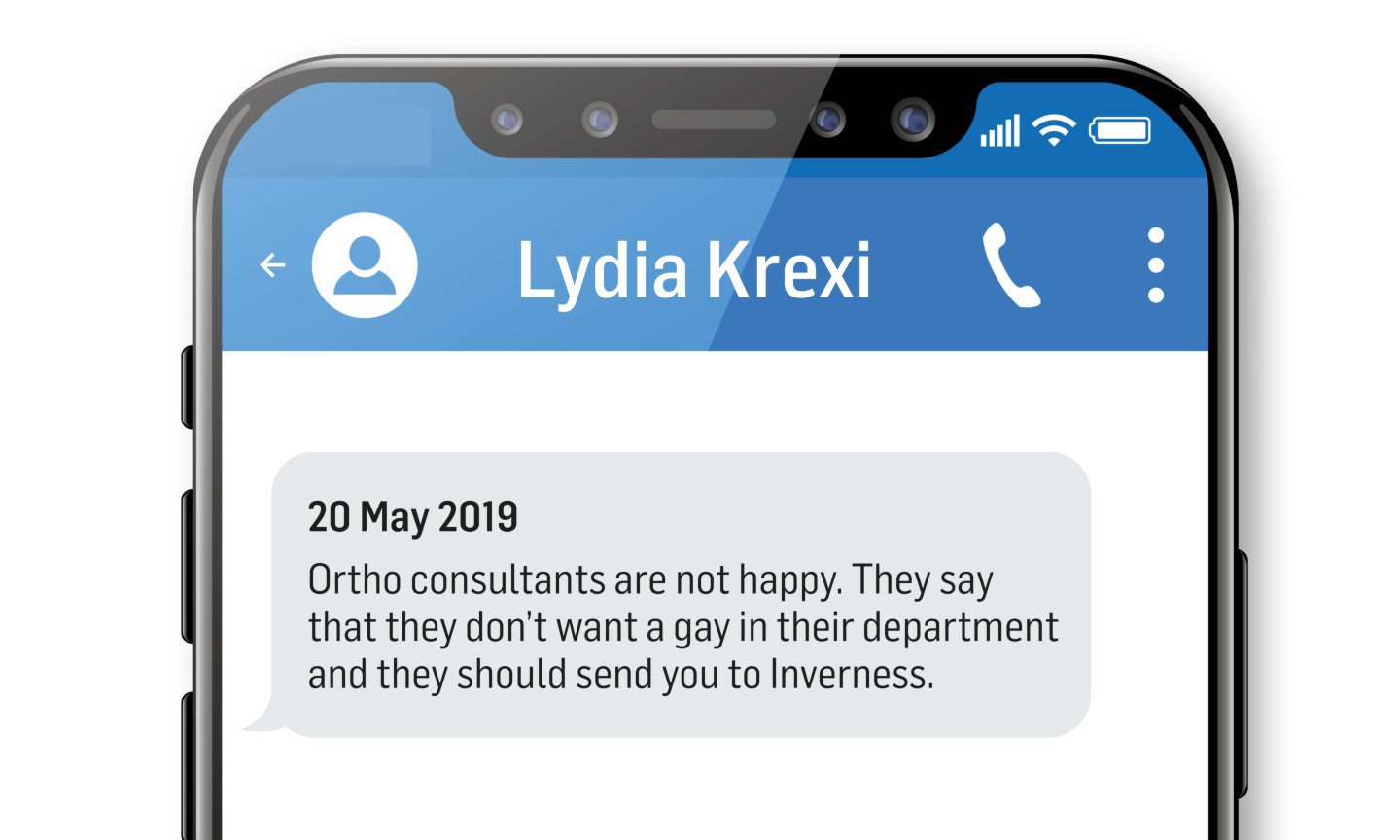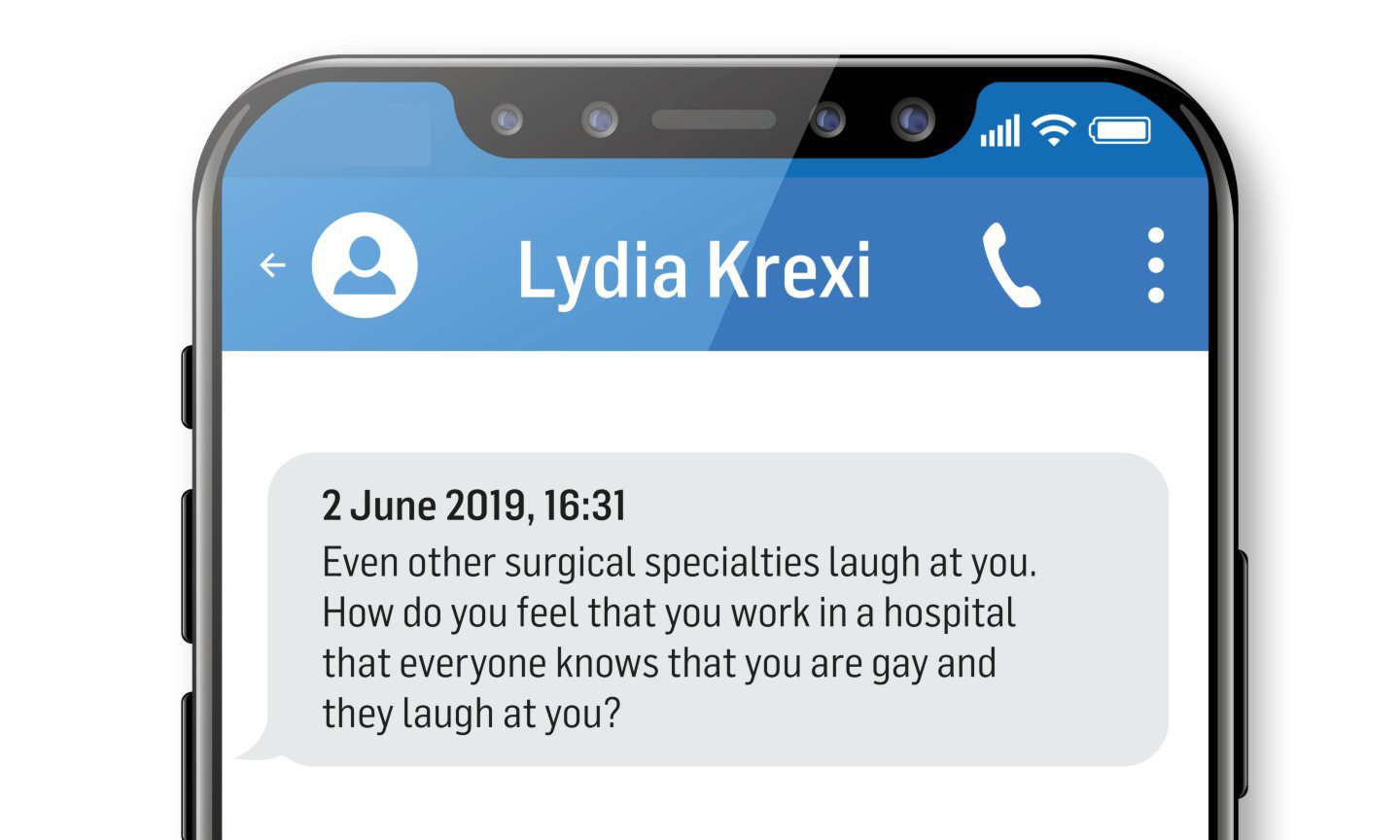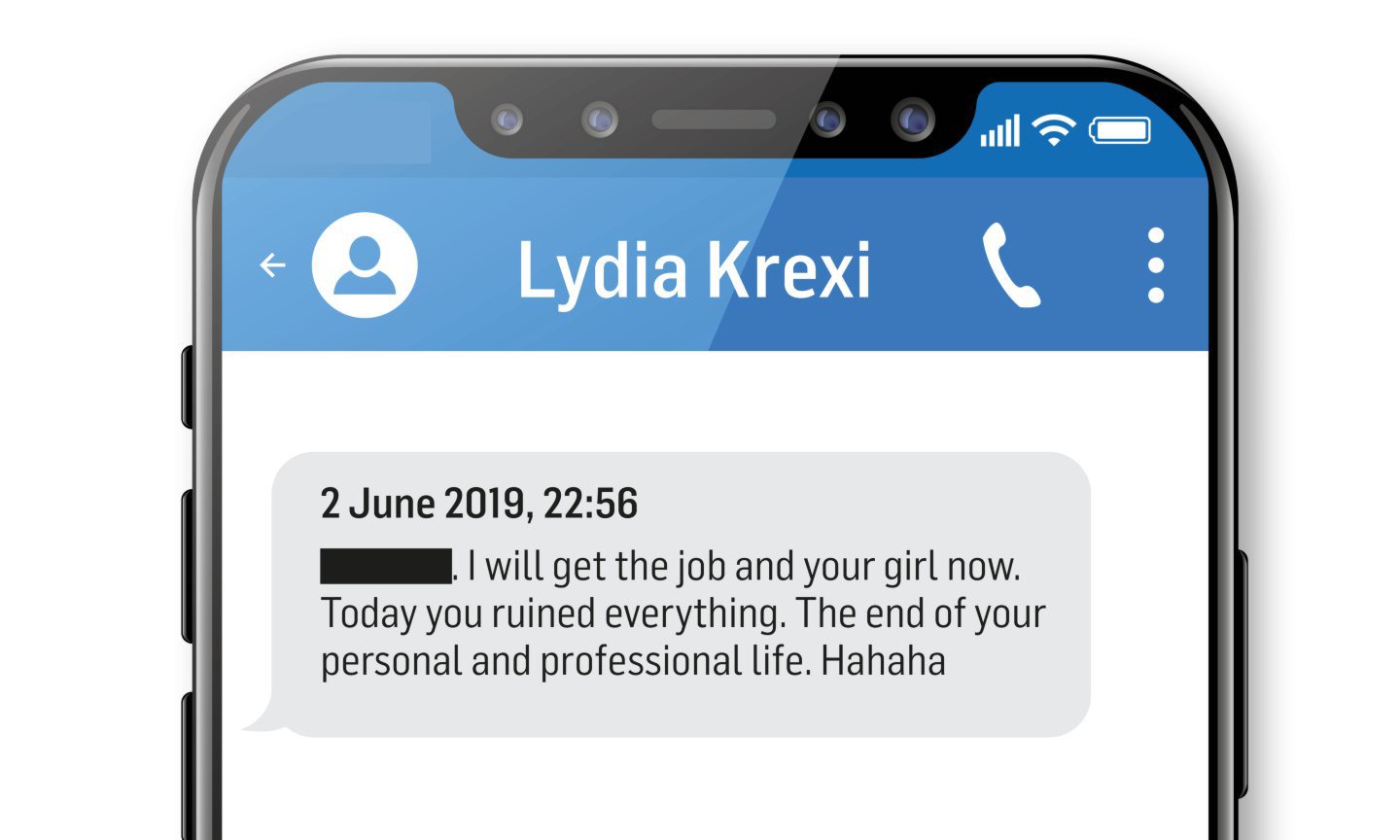An Aberdeen Royal Infirmary doctor bombarded a colleague with homophobic messages, claiming workmates said he was gay and racist, after he rejected her advances.
Lydia Krexi subjected the man, known only as Dr A, to a string of abusive texts and dozens of anonymous phonecalls.
She tried to convince him that colleagues wanted to hound him out of the hospital.
Dr Krexi also spied on the trauma and orthopaedics registrar’s medical records in an attempt to feel closer to him.
She no longer works for NHS Grampian and a tribunal has now ruled she “undermined the trust the public are entitled to place in the profession.”
But its panel hasn’t struck her from the register – noting the four years of self-improvement she’s made since the incidents.
Dr Krexi’s campaign of homophobic abuse
Dr Krexi’s abuse started on May 19 2019, when she contacted the surgeon via Facebook Messenger to tell him colleagues were gossiping.
“One of the juniors from medicine was on 212 yesterday. She was asking about you, your personal life, if you have girlfriend etc. Not sure what she was told but she left quite angry.”
It was followed by a WhatsApp message the next day, where she claimed colleagues had noticed Dr A didn’t have a girlfriend, meaning he was “probably gay”:
Further messages repeated the suggestion that colleagues had been speaking about Dr A behind his back, alleging he was prejudiced against Europeans and Christian women.
Dr Krexi suggested Dr A was in love with a colleague, Dr B, who was a trainee in infectious diseases and general medicine.
She wrote:
“Are you informed that they won’t offer you a job in ARI again? The consultants think that you are weird. You have never been with a girl. They have only seen you with [Dr B] and they think that you are in love with him. It is unacceptable for an orthopaedic surgeon to be gay and they don’t want anyone like you at the department.”
She sent seven messages on June 2 2019.
One text, at 7.37pm that day, seemingly referred to her being rejected by Dr A:
“I was direct and honest and since you told me that you aren’t interested, I haven’t contacted you again. I had good intentions. Why do you want to hurt me? I am not a whore because I am Christian and I am not desperate for a man.”
It was followed up at 10.56pm:
She also told Dr B that workmates were suggesting Dr A was in love with him.
And she messaged him on June 2, saying someone had snooped on the surgeon’s phone while he was in surgery.
“He saw his texts saying that he wants to make you get a divorce. There were very naughty texts about you.”
Additionally, Dr Krexi made 26 anonymous calls to Dr A between April 3 and May 30 2019. Most were brief, with the longest lasting four minutes.
Dr Krexi’s reasons: ‘I wanted him to go out with me’
Dr Krexi’s case was initially heard by the Medical Practitioners Tribunal Service over four days in September 2021.
It reconvened last week to hear further evidence and come to a decision.
At the tribunal, the General Medical Council’s representative, Thomas Coke-Smyth, said Dr Krexi was “lonely” and looking for “someone to speak to who cared for her”.
Dr Krexi first registered to practice in August 2017, after graduating from the Aristotle University of Thessaloniki, Greece.
She had not long moved to Aberdeen after training in London and Oxford, and had stopped regularly speaking to her family.
Following the events involving Dr A, she told an NHS Grampian internal investigation that she wanted him to “go out with me”.
Initially she saw him pop up as a suggested friend on Facebook, but ignored these as she “was not interested in Dr A in any way”.
But things soon changed, and her written statement to the tribunal explained: “After speaking to Dr A on the ward in February 2019, I got the feeling that he would like to get to know me better.
“I felt like this because he had asked a few questions about my personal life and he had told me that he would like to see me again.
“At this moment in time, I can now see that I misinterpreted the situation and this feeling was wrong.”
Dr Krexi confirmed she had wanted to develop “some sort of relationship” with the man.
‘I’m sorry, Lydia. I’m not interested.’
She sent him a Facebook message saying she wanted to be “clear and honest” and that she was interested in Dr A.
“Probably there is someone else, you don’t want a girl from the hospital or simply you are not interested.
“Whatever the reason is, it is totally understandable.
“I don’t want to make you feel uncomfortable and I don’t expect a reply.”
Dr A replied saying he was “truly flattered” and apologised for being “oblivious” to her intentions.
He added: “I can’t be in a relationship now… I want you to know this has nothing to do with you.”
Dr Krexi accepted this, but followed up two weeks later with another Facebook message.
She said her account had deleted all of her new friends – including Dr A.
While she’d tried to re-add him, he didn’t accept it “although you were online many times.”
She told him: “To me this means that I have upset you and you think bad things about me.”
A further fortnight passed and Dr Krexi sent the man another message: “I just want to let you know that you are stuck in my mind.”
She offered him one final chance to accept her advances, but this again was rejected.
Dr A replied the following day: “I’m sorry Lydia. I’m not interested.”
‘I wanted to keep my hope alive’
From here, Dr Krexi began sending the “inappropriate and offensive” messages.
The tribunal ruled that she “clearly intended to instigate a future sexual relationship” with the man.
Somewhere during this period she also spied on his medical records “without clinical justification”.
Her written statement revealed: “As I was thinking about Dr A deleting or blocking me as a friend on Facebook, I typed his name onto the computer and I accessed his medical records.
“I wanted to keep my hope alive by having his name on the screen.
“I was feeling like he was in the room.”
The tribunal heard that Dr A was unaware Dr Krexi had looked up his files.
It described the four-month ordeal as “undoubtedly distressing” for the doctor, who had referred to Dr Krexi as “the stalker”.
‘Genuine remorse’
But Dr Krexi’s representative Rebecca Harris told the tribunal that she has since shown “genuine remorse” for her behaviour.
She’s focused on setting professional boundaries, and learning about communication skills and data protection.
Dr Krexi has also become a facilitator for equality and diversity case-based discussions at Oxford University, which “demonstrates her commitment to teaching others to be open-minded, respectful and to report any inappropriate behaviour.”
The tribunal said her actions in 2019 “constituted serious misconduct” – but was aware that four years have now passed.
Because she has not repeated these actions, worked on improving herself and shown “real insight” into what happened, it said it would place a warning on her registration.
It added that any repetition in the future would likely see her struck off.







